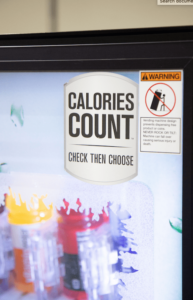by Andrea Traietti on February 13, 2020
Opinion

by Olivia Bretzman ’22
Opinion Staff
Third floor. Aquinas Hall. The vending machines play an essential role for the residents when a late-night snack helps quell the struggle of a study session or paper-writing. One thing, though, that really puts a bad taste in one’s mouth is the large sticker plastered on the drink machine that reads, “Calories Count. Check Then Choose.”
The American Beverage Association, which represents Coca-Cola Co., PepsiCo Inc., and Dr Pepper Snapple Group Inc., placed these decals on their drink vending machines as a way to encourage people to make healthier choices when purchasing a drink, like swapping soda for water.
The concept of making healthy decisions is incredibly important on many levels. What is problematic with this particular sticker, even though it is well-intentioned, is the fact that they could be triggering for anyone struggling with an eating disorder. Unfortunately, the reality is that many people struggle with eating disorders or poor body image, something our campus does not talk about enough.
In fact, it is a psychological fact that surrounds this issue: predisposition to calorie counting and poor body image manifests into obsessive compulsive habits with food. This reminder, then, to “count one’s calories,” can actually be a severe detriment to someone’s health. Anyone walking by these decals—even people who are not purchasing a drink—can be affected by their messaging.
Companies should consider this fact when designing the slogans for their health initiatives. But as a campus, we can go further: we need to foster more conversation about eating disorders and body image.
Eating disorders are a mental illness. It is as simple as that. They typically begin with a negative relationship with food and a psychological shift that food is “evil.” People typically try to overmanage their food, calculating calories, setting strict daily limits, etc. This begins as an obsessive cycle that can lead to starvation and, consequently, binge eating. A plethora of health concerns obviously surround all eating disorders.
Unfortunately, for sufferers of these mental illnesses, the nourishment the human body craves becomes an incredibly unhealthy management project. Thus, one can understand where a sticker that encourages counting calories, while meant to suggest a healthy drink, does nothing but perpetuate the problem.
Many students struggle with or even develop eating disorders in college due to stressful workloads, the pressure of transition, social media, etc. Thankfully, there are many who are aware of these disorders at Providence College. Members from the Simply Healthy Club recognize the threat these stickers have on mental health.
Secretary Allyson Giso ‘22 stated, “I don’t think it was worded correctly. Health doesn’t necessarily equate to calories.” Not only is this statement incredibly accurate, but it is a main tenant of living a balanced and healthy lifestyle.
President Corinne Maier ‘22 claimed, “If I saw it, I wouldn’t grab the cookies or candy. But that is what the vending machines are for. Why else would we have them?” Vending machines are meant for pleasure and snacking, not overthinking the little things in life.
In all reality, this issue is more prevalent than one may believe. Marketing Director Julia O’Dwyer ‘22 states, “I think it is desensitizing. There are so many people you don’t know who struggle with eating disorders, so if someone is going through that and sees something like that, it’s very triggering.”
To counteract triggers, a couple of things are necessary. First, we need to destigmatize mental illness on PC’s campus, and second, we can emphasize the concept of balance. Sure, we have an incredibly healthy campus. Many students go to the gym, eat healthy meals, and are passionate about nutrition and sports. There are also a plethora of mental health clubs and events, bringing awareness to depression, anxiety, bipolar disorder, etc.
However, eating disorders are not typically a topic of conversation.
Doctors and psychologists specializing in eating disorders are beginning to promote HAES, which stands for “Health at Every Size.” Instead of focusing on losing a certain amount of weight and promoting unhealthy behavior, doctors are beginning to take a sensitive and balanced approach that plans out steps for long-lasting, healthy results. They focus on wellness and eating patterns over calorie counting and excessive food thought.
In reality, societal pressures cause an enormous amount of stress despite the recent emphasis on self-love and body acceptance. Sure, these are all great, yet hardly effective in the mind of someone with an actual eating disorder.
We cannot remove the stickers put up by a corporation or force them to change their messaging—at least not immediately. But what we can do right away is remain mindful of triggers, and start having conversations on this campus about healthful, balanced lives in order to support our community in the best ways we can.